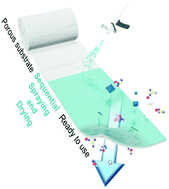A compact and scalable fabrication method for robust thin film composite membranes†
Abstract
Membrane-based liquid filtration systems have been highlighted as a key green process engineering platform for process intensification. While these systems have been successfully commercialized in desalination and micro/ultra/nanofiltration, it is yet challenging to expand the limited operating conditions (ambient temperature in an aqueous environment) of the currently available membranes, and to solve the exacerbating environmental burden during the fabrication of polymeric membranes. Herein, a new green and compact fabrication method is proposed for both (i) fabricating a robust membrane that can function beyond the typical operating conditions of conventional membranes and (ii) minimizing waste creation and production time. In this work, contrary to the conventional phase inversion method, a spray-coating technique was employed to fabricate a thin composite membrane with high temperature stability and fast solvent permeability. The proposed compact fabrication method can reduce the carbon footprint and the usage of polymers and solvents more than twofold, and eliminate the time-consuming coagulation and washing steps, both of which generate an enormous amount of solvent-contaminated wastewater (up to 50 billion liters per year). Furthermore, the process used dimethyl sulfoxide to bypass conventional N,N-dimethylformamide and N-methyl-2-pyrrolidone as a green solvent, and can simultaneously fabricate a membrane ready to use within a half-day. The resulting membrane exhibited remarkable stability and performance for the separation of solutes in N,N-dimethylformamide, even at elevated temperatures not feasible with conventional polymeric membranes, and so it is a candidate for potential use in the pharmaceutical and fine chemical industries.



 Please wait while we load your content...
Please wait while we load your content...